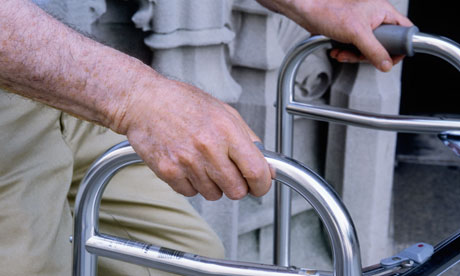A consultation on the walking distance benchmark to qualify for help with mobility needs a strong, uncompromising response

'The combination of political and legal pressure finally seems to have convinced the government to undertake specific consultation on the 20-metre distance.' Photograph: Sandra Baker/Alamy
The government has announced a consultation on the personal independence payment (PIP) – the disability benefit that replaces disability living allowance (DLA). After telling us for months that the consultations on PIP were more extensive than any previous consultation and that it had really listened, the government announced its intention to reconsult on the mobility component of the new benefit. The political and legal context tells us that this is about whether the bar has been set too high for the mobility criteria, as many disability organisations have argued.
The history of the government's handling of DLA is not a happy one. There was widespread unease that the overhaul was launched with a cost-cutting agenda, with the government promising to reduce the projected cost of the new benefit by 20% (£2bn) by 2015-16. Official estimates suggest that by 2018 about 607,000 fewer people will be getting PIP than were receiving DLA, and many will receive a lower award. Scope was among the many disability charities and groups that expressed confusion that the government was "able to predict exactly how many disabled people will receive support before they have even been tested".
The Spartacus report Responsible Reform showed that the first consultation was not supported by the majority of the 5,500 respondents. There then followed extensive consultation on the PIP criteria, but when the draft regulations were tabled in December, they included a 20-metre walking distance criteria, which wasn't even mentioned in the consultation and contradicted the 50-metre benchmark, which for decades has been accepted as the appropriate distance for determining if someone has limited walking ability.
Additional pressure has been applied to the government by an application for judicial review by DLA claimant Steve Sumpter, who has limited walking ability, uses a wheelchair and a Motability car and is concerned that he could lose his car under the 20-metre criteria. His application – on the grounds that the official consultation did not mention the reduced distance criteria – is due to be heard next month.
The combination of political and legal pressure finally seems to have convinced the government to undertake specific consultation on the 20-metre distance. The timing is critical. PIP was rolled out nationally last week for new claimants and current DLA recipients whose awards need to be renewed will have to apply for PIP from October. If coalition MPs who are unhappy with the 20-metre decision take this opportunity to represent the needs of their disabled constituents, we could be looking at a decision before October to replace the 20-metre benchmark with 50 metres. This would prevent many thousands of disabled people losing benefits that help them get around, such as leasing a car under the Mobility scheme.
So, this consultation needs a strong, uncompromising response from disabled people, healthcare professionals, social workers, welfare rights advisers, politicians and anyone who cares about the independence, inclusion and human rights of disabled people. We can't afford to let our disillusionment with government policy making stop us fighting for independent mobility.